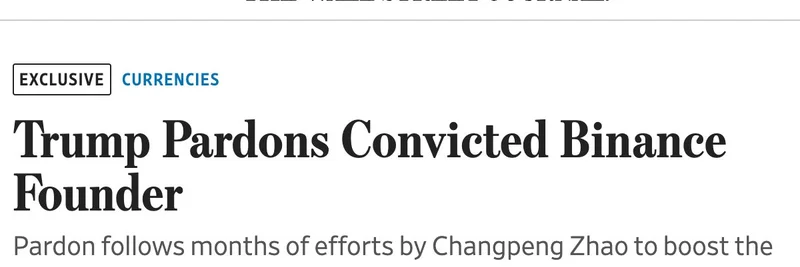In the ever-evolving world of crypto, where politics and blockchain often collide, a recent tweet from @basedkarbon has stirred up quite the conversation. Quoting Senator Elizabeth Warren's pointed criticism of Changpeng Zhao's (CZ, the founder of Binance) pardon by President Trump, the post warns that this could backfire on the entire industry. Let's break it down and see what it means for meme token enthusiasts and blockchain practitioners alike.
The Backstory: CZ's Legal Troubles and Surprise Pardon
For those new to the saga, CZ pleaded guilty to money laundering charges back in 2023, leading to a prison sentence. Fast-forward to now, and he's reportedly financed Trump's stablecoin project while lobbying for a pardon—which he just received. Warren, a longtime crypto skeptic, didn't hold back in her original post, calling it outright corruption and urging Congress to step in.
@basedkarbon's response pulls no punches: "These demons will bring the wrath of God down upon our industry if they regain power in 2028." It's a stark reminder that crypto is no longer just about tech and tokens—it's deeply entangled in U.S. politics. Trump positioning himself as the "crypto president" might feel like a win today, but as the tweet suggests, it could "bite us in the ass" if Democrats flip the script in future elections, like the 2026 midterms or 2028 presidential race.
Why This Matters for Meme Tokens
Meme tokens, those fun, community-driven assets like Dogecoin or newer ones on Solana and Base chains, thrive on hype and accessibility. But when crypto becomes a partisan issue, regulatory crackdowns could hit hard. Imagine stricter rules on exchanges like Binance, which often list meme coins, or broader scrutiny on stablecoins that underpin many DeFi plays. If Warren and her allies push back, we might see tougher enforcement from agencies like the SEC, making it harder for retail investors to jump into the next viral meme.
Replies to the thread echo this unease. One user jokes about CZ being a "Chinese spy," highlighting lingering trust issues in the space. Another points out that the community "didn’t ask for this, but we may pay for it," underscoring the unintended consequences of political alliances.
Navigating the Partisan Shift in Crypto
Crypto's appeal has always been its borderless, decentralized nature—free from traditional politics. Yet, with Trump embracing it (remember his NFT drops and pro-crypto rhetoric?), the industry risks alienating half the political spectrum. For blockchain practitioners, this means staying informed on policy shifts. Tools like CoinDesk or our own Meme Insider knowledge base can help you track these developments.
If you're building or trading meme tokens, consider diversifying beyond U.S.-centric platforms. Look into decentralized exchanges (DEXs) on chains less tied to American regs, or explore global communities where politics play less of a role.
Looking Ahead: Lessons for the Crypto Community
This drama is a wake-up call: crypto's future isn't just about tech innovation; it's about smart advocacy. By aligning too closely with one party, we invite backlash from the other. As @basedkarbon warns, problems could arise sooner than 2028 if midterms go south.
Stay tuned to Meme Insider for more on how political winds affect meme tokens. Whether it's analyzing the next big pump or decoding regulatory threats, we've got your back in this wild world of blockchain.



